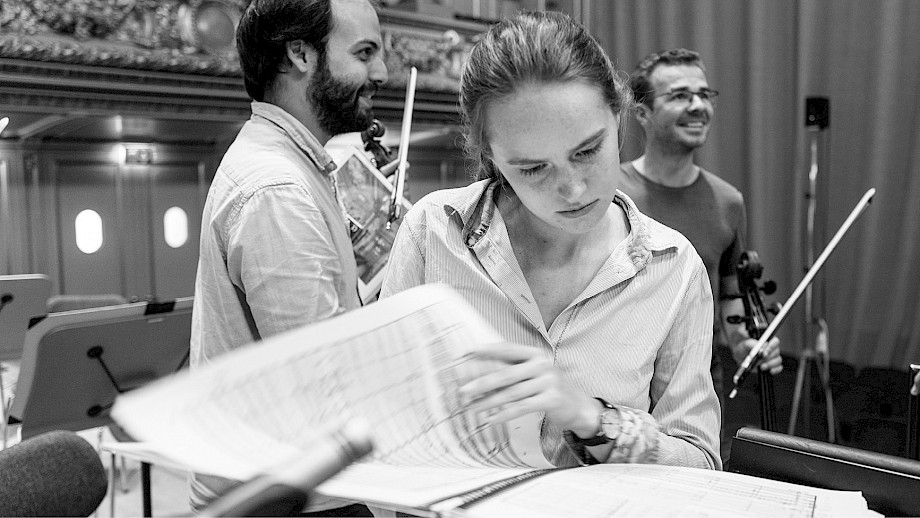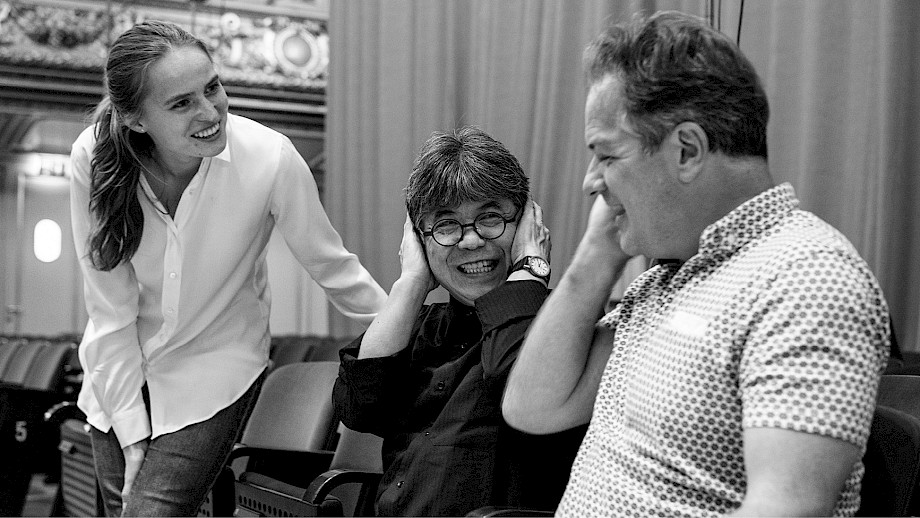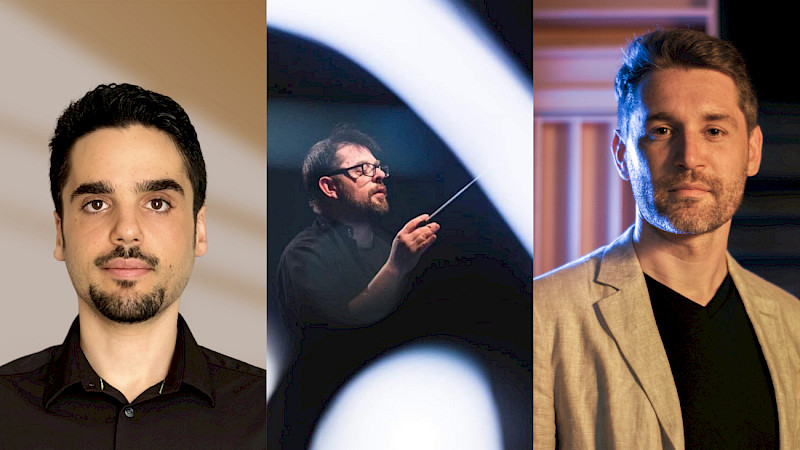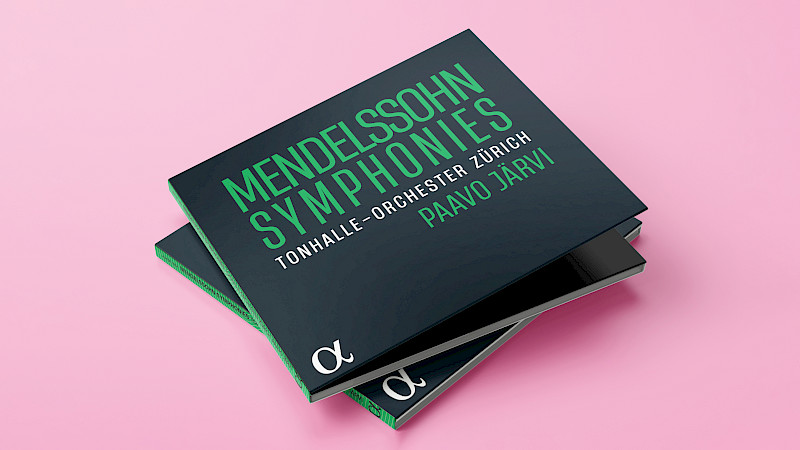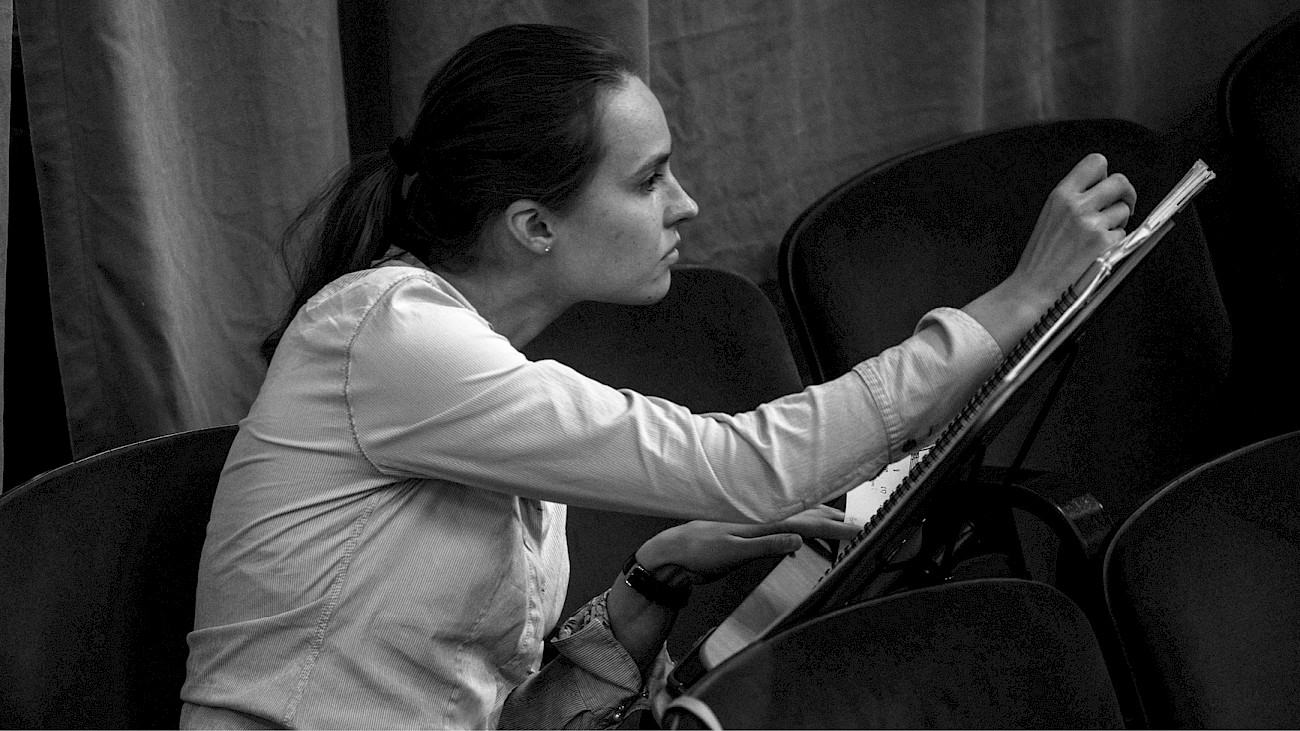
«I have to have the sound in my hand»
How does a talent become a conductor? Izabelė Jankauskaitė studies at Zürcher Hochschule der Künste (Zurich University of the Arts) – and is currently Paavo Järvi's assistant conductor. A story about magic, courage and mentors.
«Magic, magic, magic» is how 24-year-old Lithuanian Izabelė Jankauskaitė describes the moment when she decided to become a conductor. Five years ago, she was attending a grammar school with a focus on music in Vilnius, had been singing in the choir for a long time and, after a few lessons in choral conducting, took part in a conducting competition. When she stood in front of the choir at this competition and felt the connection with the singers – «it clicked».
Johannes Schlaefli, Izabelė Jankauskaitė's teacher at Zürcher Hochschule der Künste, also speaks of magic. «Izabelė has magic hands,» he says, «it is rare that someone brings such a natural talent for communicating sounds.» He speaks of «sound touch», of the special ability to convey the inner ideas of the orchestra musicians.
So that magic becomes a craft and a talent becomes a conductor: But it takes a lot to do that. What is it? And how do you learn it?
Use advantages, compensate for disadvantages
Schlaefli has as many answers to this question as there are students. «Everyone brings something special to the table – and has to work on other things. Because «sorting the air», as Bernard Haitink once described conducting, is a complex matter: very subtle and difficult to grasp on the one hand, on the other it requires many concrete skills. The training is about beat technique and score analysis, knowledge of style and rehearsal logistics, listening training and communication, psychological skills and self-reflection.
No one is equally gifted for all that. Izabelė, for example, says Schlaefli, is «not by nature an alpha who expands». And unlike others who play the violin from an early age and get to know the symphonic business from the inside in youth orchestras, she is initially at a disadvantage as a choral singer and pianist. «But she learns enormously fast. And she has bite: among two possible paths, she often chooses the one that is more difficult for her.»
Perseverance and adventurousness
This is also noticeable in conversation. As reserved as Izabelė Jankauskaitė appears, she makes her decisions unerringly. A magic moment is one thing; to draw the consequences from it and to be the first in the family to make music her profession requires a completely different kind of perseverance.
You also need mentors, people who encourage and support you, provide you with tips and contacts, let you watch rehearsals and give you feedback. You don't learn conducting in a quiet room, not even from books. Those who grow up in a musical family have their first supporters right at home. Others, like Izabelė Jankauskaitė, have to look elsewhere. For her, her piano teacher was the first important mentor: «Without her confidence, I probably wouldn't have had the courage to make this decision».
And finally, a sense of adventure is part of it. Izabelė and her boyfriend – also a budding conductor and her most important companion – travelled through half of Europe in search of the right place to study. Then at Zürcher Hochschule der Künste she felt she had arrived, «it was a good feeling». At first she studied choral conducting, but soon she sat down regularly at the rehearsals of the Tonhalle-Orchester Zürich, «that's when I first discovered how many colours of sound there are, how great the symphonic repertoire is».
So she started learning the violin. She didn't get very far with it, «but I understood the instrument». She also attended a public course with Johannes Schlaefli – and was then able to switch to his conducting class.
Jump into the deep end
Many push into this class, Schlaefli receives 60 to 80 applications per year, he can accept a maximum of three new students. At the latest since his former student Mirga Gražinytė-Tyla made her big breakthrough as principal conductor in Birmingham, he has been one of the most sought-after conducting teachers internationally. After his retirement from the ZHdK in two years, he will continue with his own academy. He has developed a concept that is now widely recognised, with a lot of group lessons, with many exercises with orchestras.
Because that is the main problem for young conductors: They need an orchestra to get ahead. Or even better, different orchestras, «because what works for one can go wrong for another,» says Schlaefli. Izabelė Jankauskaitė appreciates this experience, «even if at the beginning I found it difficult to make mistakes publicly in front of musicians, so to speak». She has been able to work with half a dozen different orchestras so far, «some are very open and benevolent, others react more reservedly». She has learned from all of them.
For a few months now, she has also been doing it as Paavo Järvi's assistant conductor – because she was ready to jump into the deep end. She had attended his academy at the Pärnu Festival in the summer of 2021, and some time later she received a call asking if she could stand in as his assistant: «It was Saturday evening, rehearsals were to begin on Monday, and I was at home in Vilnius and only knew the works roughly.» She had one day left to study and organise the trip to Zurich, where she did such a good job that she was asked to assist this season.
Conducting is not in the foreground; she will only be on the podium herself for two family programmes. Most of the time she sits in rehearsals as Paavo Järvi's second pair of ears, so to speak. She listens, thinks, sticks countless post-it notes in the score, notes details about tonal balance, inconsistent articulations and wrong notes. During the interval, she discusses her observations with Järvi, «but not all at once. I have to choose what I want to address».
Tips and warnings
She is currently experimenting with the best way to do this. Holly Choe, Paavo Järvi's last assistant conductor, has provided her with many tips, «including a few warnings». But she has to find out for herself how to do her job in the most meaningful way – there are no recipes for that either.
Paavo Järvi knows this: «There are no shortcuts on the way to the orchestra,» he says, and he is referring not only to young conductors but also to orchestral musicians. They, too, have to empathise with this sound cosmos and its structures; the skills on one's own instrument are only the prerequisite for something that can hardly be trained at home alone. The Tonhalle-Orchester Zürich therefore has a great responsibility, says Järvi: «It is part of our mission to help young musicians».
This is done on very different levels. In addition to the position of Järvi's assistant conductor, there is the annual Conductors' Academy and internships for orchestra musicians; a programme for student managers was launched to give them a taste of orchestra management. All of these mentoring projects are about enabling experience. And above all, the conducting assistantship also guarantees visibility, which can be crucial in terms of a career.
Full agenda, good agency
Holly Choe, Izabelė Jankauskaitė's predecessor, has been able to seize this opportunity. She completed her studies with Johannes Schlaefli while assisting and now has a well-filled agenda, an agency and a position as principal conductor with the Hamburg ensemble Reflektor. Everything worked out for her, says Schlaefli, «she took off for free flight».
Izabelė Jankauskaitė is in no hurry. She sees herself at the beginning of her journey, «there is still so much to discover, to try out, to work out». Asked what the most important thing she has learned in her training so far is, she says: «Win the battle.» So don't be shy, don't settle for the vague, but keep at it in exchange with the orchestra until the sound is as it should be; until it is part of her and she can shape it.
«I must have the sound in my hand», she says, «it is my instrument». The gesture with which she underlines this sentence would be understood by any orchestra as a call for a particularly striking accent.
Translated with DeepL




